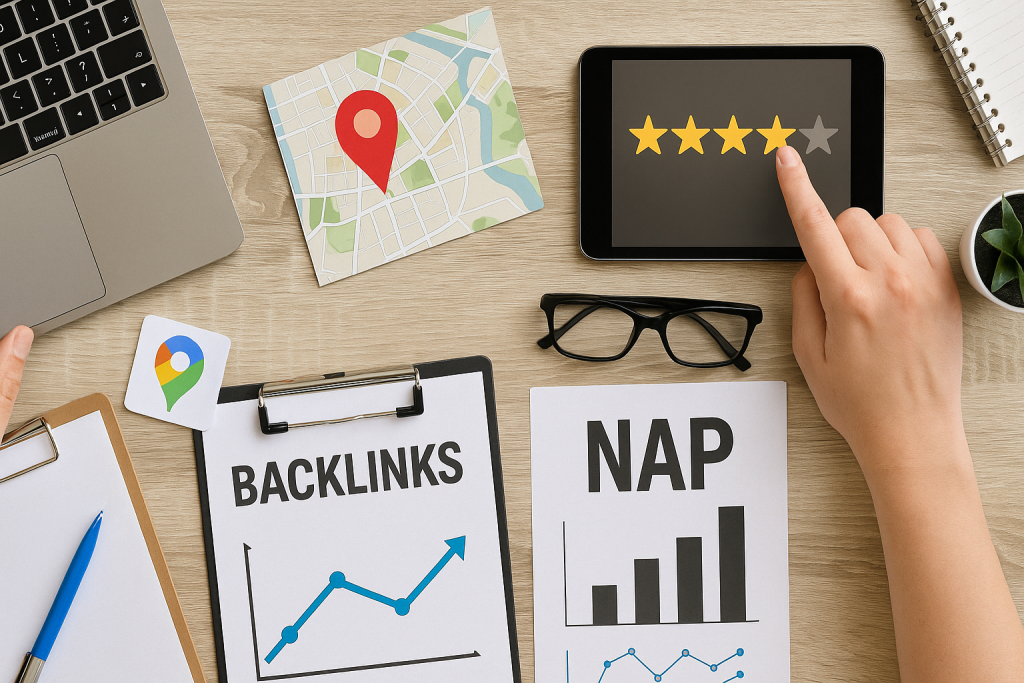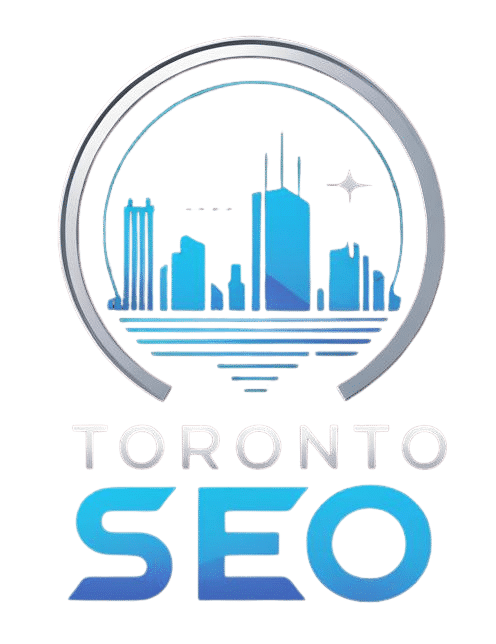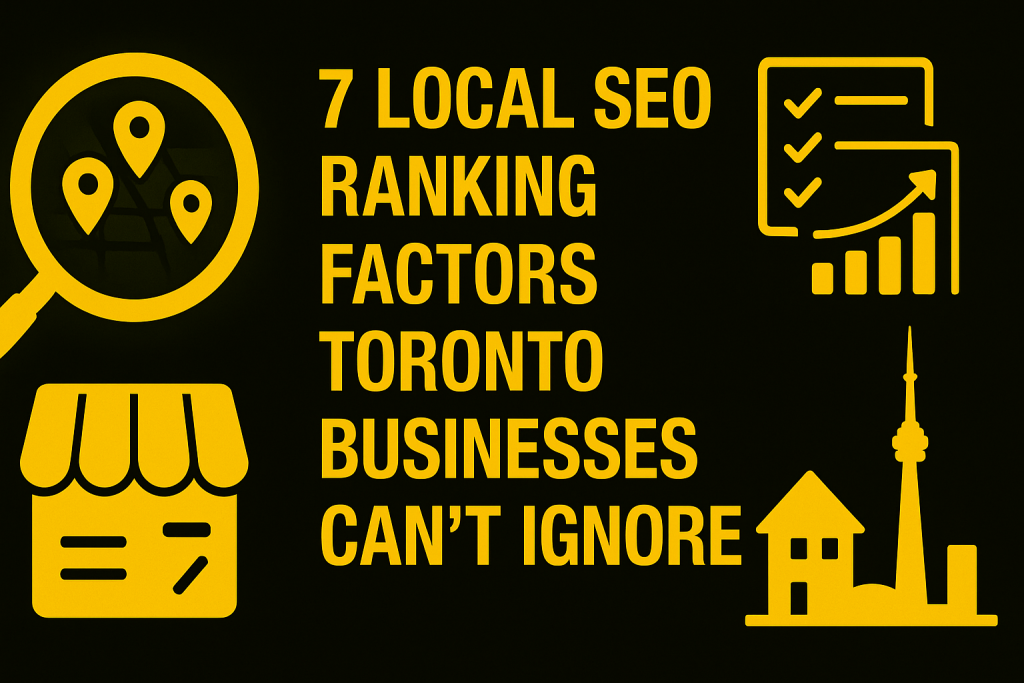Local SEO is no longer optional for Toronto businesses — it’s the foundation of how customers discover, evaluate, and choose local services. Whether you run a restaurant on Queen Street, a law firm in the Financial District, or a home renovation company in Etobicoke, optimizing for local search determines how visible you are when potential clients search “near me.”
The Moz Local Search Ranking Factors Study highlights that citation consistency remains a key trust signal in Google’s local algorithm, especially for competitive metro areas like Toronto.
In this guide, we’ll break down the 7 most critical local SEO ranking factors Toronto businesses must master to dominate Google Maps, the Local 3-Pack, and organic results — and we’ll show you how to implement each effectively.
1. Google Business Profile Optimization: Your Digital Storefront
Your Google Business Profile (GBP) is the single most influential ranking factor for local SEO. It’s what powers your visibility in the map results and the “Local 3-Pack” — the top three listings users see when searching for local businesses.
An optimized GBP should include:
Complete and consistent business name, address, and phone number (NAP)
Accurate service areas and categories
Engaging descriptions using local keywords like “Toronto SEO agency” or “plumber in Scarborough”
High-quality images and regular post updates
A properly optimized profile not only increases visibility but also conversion. According to Google, businesses with complete profiles get 70% more visits and 2x more trust from local customers.
👉 Learn how to fully optimize your GBP with The Ultimate Google Business Profile Toronto Guide.
2. Local Citations & NAP Consistency: Building Trust Across the Web
Your business citations — listings on directories like Yelp, YellowPages, and industry-specific platforms — play a massive role in local rankings.
When your Name, Address, and Phone (NAP) are consistent across these directories, Google views your business as trustworthy and established. However, even small inconsistencies (like “Street” vs “St.”) can confuse algorithms and reduce your authority.
To stay ahead:
Audit your citations quarterly
Ensure NAP consistency across Google, Facebook, Yelp, Bing Places, and local Toronto directories
Submit your business to Toronto-specific directories like BlogTO Listings or Toronto.com
For more on why citations still matter, read Why Citation Building Still Matters for Toronto Local Rankings in 2025.
3. On-Page Local Optimization: Location Keywords & Content Structure
While backlinks and citations establish trust, on-page SEO signals relevance. To rank locally, your website content must clearly communicate where you are and what you do.
Key local on-page tactics:
Include your target location (e.g., “Toronto,” “Etobicoke,” “North York”) in titles, H1s, and URLs
Add a Location Page for each area you serve (e.g., “SEO Services in Mississauga”)
Embed a Google Map of your business location
Write locally relevant blog content (e.g., “How Toronto Businesses Can Prepare for Google’s 2025 Algorithm Update”)
Toronto businesses should think in content clusters — each service page supported by related articles. Check out Content Optimization: Boosting Engagement and Rankings to learn how.
4. Local Reviews & Reputation Management: The Trust Factor
Customer reviews are one of the most powerful ranking and conversion factors in local SEO. Google uses both the quantity and sentiment of reviews to gauge local trustworthiness.
Pro tips for review management:
Ask satisfied customers to leave reviews directly through your Google profile link
Always respond to reviews (positive or negative) — it shows engagement and transparency
Avoid fake reviews — Google penalizes manipulation
Showcase testimonials on your website
Toronto’s competitive markets — like law, real estate, and healthcare — see massive ranking differences between businesses with 20+ reviews vs. those with fewer than 5.
For guidance on review strategy, see Review Strategy for GTA Businesses.

5. Local Backlinks: Authority from Community Connections
Local backlinks are still a top-tier ranking factor because they prove your business’s relevance and authority within a geographic area.
Toronto businesses can build strong local backlinks through:
Sponsoring local events, charities, or sports teams
Joining business associations like the Toronto Board of Trade
Earning mentions in local media like Toronto Star or CP24
Collaborating with complementary businesses
When local publications or directories link to your domain, it boosts your relevance in that region — something Google values immensely.
For a deeper look, read How Toronto SEO Agencies Build High-Authority Backlinks Without Guest Posting.
6. Behavioral Signals: Engagement Metrics that Influence Rankings
Google increasingly prioritizes user engagement metrics — including click-through rate (CTR), dwell time, and interaction with your GBP profile.
Ways to improve engagement:
Use conversion-first web design with clear calls-to-action
Optimize your site for Core Web Vitals (speed, interactivity, stability)
Update your GBP regularly with events, posts, and offers
Add FAQs, photos, and appointment booking buttons
Toronto businesses that focus on UX and engagement tend to dominate search, especially in service industries where mobile users make quick decisions.
Learn more about engagement metrics in Conversion-First SEO Toronto.
7. Proximity & Personalization: The Hidden Google Maps Factor
Proximity is one of Google’s most influential — yet least controllable — local ranking signals. Search results vary depending on where the user is located when they search.
What you can control:
Add multiple service area pages to cover key Toronto neighborhoods (e.g., “SEO in Downtown Toronto,” “Scarborough SEO Services”)
Include local schema markup for your address and service areas
Build engagement with users in your immediate area through social media and ads
To maximize proximity signals, combine SEO with Google Ads and social media targeting. Toronto businesses that layer strategies dominate both map packs and organic results — a trend discussed in Why Toronto Brands Are Combining Google Ads and SEO for Maximum Visibility.
Local SEO Bonus Tip: AI-Powered Optimization for Toronto SMBs
As Google evolves toward AI-first search, Toronto businesses must leverage machine learning tools for keyword research, citation management, and predictive analytics.
AI SEO platforms like Surfer, BrightLocal, and Jasper can analyze local ranking factors in real time, helping SMBs outperform larger competitors. Learn how top agencies are adapting in Top SEO Agencies in Toronto Are Using AI to Outrank the Competition.
Real-World Example: How Local SEO Tripled Leads for a Toronto Business
A downtown Toronto service business saw a 230% increase in organic leads after improving their Google Business Profile, citation consistency, and backlink strategy.
They followed the 7 ranking factors outlined here and documented their success in How a Toronto Business Tripled Organic Leads in Just 90 Days.
FAQs
1. How long does it take to see results from Local SEO in Toronto?
Most Toronto businesses see visible improvements within 3–6 months, depending on competition, consistency, and existing online authority.
2. Do I need a Google Business Profile to rank locally?
Yes — without a GBP, you’ll miss out on Google Maps visibility and the Local 3-Pack entirely. It’s essential for every local business.
3. What’s the difference between regular SEO and local SEO?
Local SEO focuses on geo-targeted visibility — optimizing for specific locations and “near me” searches — whereas standard SEO targets broader, often national, audiences.
4. How can I get more reviews for my Toronto business?
Ask satisfied customers via SMS or email follow-ups, include review links in receipts, and post reminders on social media.
5. Should I hire a local SEO agency in Toronto or do it myself?
If your goal is to grow aggressively, hiring a local expert is more efficient. Read Hiring a Toronto SEO Expert vs Doing It In-House: Pros & Cons for insights.
Conclusion: Dominate Toronto Search with a Local-First Strategy
To stay competitive in Toronto’s evolving digital ecosystem, your local SEO strategy must focus on the 7 pillars: Google Business Profile, citations, content, reviews, backlinks, engagement, and proximity.
By combining strong local foundations with smart AI-driven SEO, Toronto businesses can rank higher, attract consistent leads, and build long-term visibility.
If you’re ready to optimize your local presence, contact TorontoSEO.com — our team specializes in helping businesses dominate Toronto search results with precision and measurable ROI.


